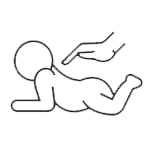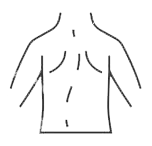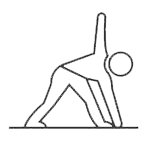| |

|
|

|
|

|
|
|

Proper psychomotor development of a baby
The development in the first year of human life is essential for the function of muscles, and for the posture and shape of the body and the spine in later years. We focus on discovering any irregularities and their timely removal by exercise. The ideal time for an examination of a baby is between the 4th and 6th week of his or her life.
There are several developmental milestones and it’s important to make sure they proceed in the highest quality possible. The first is the period of the first three months of the life during which the baby needs to become stable in space and be able to rest on its forearms while lying on the belly. In the period of the sixth month, the baby turns from the back to the belly and rises to lean on stretched arms. Around the eighth month, the baby gradually rises to crawl on hands and knees. Crawling is the most important thing here. After the tenth month, the baby rises to the vertical position, first walking while leaning on furniture and later walking without help.

Improper body posture
If there have been developmental irregularities for any reason (suboptimal development during infancy, lack of movement, excessive load etc.), a very effective solution for their correction is targeted physiotherapy which helps to fix incorrect movement stereotypes.
The muscle system has a critical, formative influence on the posture of the spine and the whole body. A proper active approach, based on individually targeted exercises, improves the effective cooperation of muscles, joint postures and spine posture. This helps to prevent future pain and wear of the organism.

Compensation of overexertion caused by sports
Sport activities – especially professional sports – can lead to the overexertion of the body. We will teach you proper compensating exercises which will help you to ensure movement longevity. We know from experience that this approach can reduce overexertion or even completely stop it.
|
| |
|
|